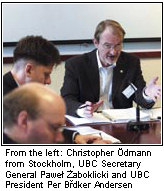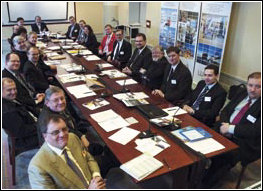42nd Executive Board Meeting
in Lulea
The 42nd meeting of the UBC Executive
Board was held on 5 March 2005 in the City of Lulea, Sweden,
upon the invitation of Mr Karl Petersen, Mayor of Lulea.
 The
City of Turku informed about the status of preparations
and the programme of the VIII UBC General Conference to
be held in Turku on 29 September - 2 October 2005. The General
Conference will deal with the following issues: logistic
corridors, EU budget and its implications for the Baltic
Sea Region, good governance, competitiveness, good neighbourhood
policies, human contacts in the B SR, etc. During the GC
the following events would also take place: meeting of the
Committee of Senior Officials of the CBSS, coordination
meeting of the Baltic Sea organisations, seminar of the
Baltic Region Healthy Cities Association. The last day of
the General Conference would be devoted to the internal
UBC matters such as reports, elections, finances, etc. The
City of Turku informed about the status of preparations
and the programme of the VIII UBC General Conference to
be held in Turku on 29 September - 2 October 2005. The General
Conference will deal with the following issues: logistic
corridors, EU budget and its implications for the Baltic
Sea Region, good governance, competitiveness, good neighbourhood
policies, human contacts in the B SR, etc. During the GC
the following events would also take place: meeting of the
Committee of Senior Officials of the CBSS, coordination
meeting of the Baltic Sea organisations, seminar of the
Baltic Region Healthy Cities Association. The last day of
the General Conference would be devoted to the internal
UBC matters such as reports, elections, finances, etc.
The Chairman of the UBC Logistics Task Force,
reported about the activities of the Task Force and outlined
the present situation of the logistic corridors in the BSR.
The task force was created by the Board in May 2004. Its
tasks include the preparation of the next UBC General Conference
in Turku, where transport and logistics issues will be one
of the key items. The Task Force emphasizes that modern
port and land transportation infrastructure coordinated
with maritime transport is crucial for the development of
the B SR. The next meeting of the Task Force is scheduled
for 26-27 May 2005 in Turku.
On the UBC's initiative, the major Baltic
Sea organisations namely: B7, BSSSC, CPMR-BSC, UBC, decided
to send to the EC the joint statement on the Objective Three
of the reformed cohesion policy from 2007 - namely the European
Territorial Cooperation. The statement emphasizes the fact
that the cross-border cooperation in the BSR may be severely
harmed if the limit of 150 km for maritime border is introduced.
UBC is of the opinion that the maximum distance of 150 km
of maritime border (to be eligible to obtain funding for
cross-border projects) is contrasting with the idea of strengthening
the territorial cooperation and therefore we object to it.
UBC expects a more flexible approach in taking into account
existing and historical cooperation between the partners
on both sides of maritime border. The Board authorised the
President to send a letter with the statement to the prime
ministers of 10 Baltic Sea countries. The Board members
were obliged to make sure that the proper attention will
be given to the letter in their countries.
In December the President sent out a letter
to the member cities asking them to express their views
how we can make our own organisation, the UBC, even stronger.
In the letter the President noted that a year ago on 1 May
we have experienced a significant historical moment - the
Baltic Sea Region became almost an inland sea of the EU.
This fact will have a strong positive impact on further
development of our region and it must have an impact on
the activities of the UBC. The EU enlargement in the BSR
brings new opportunities and challenges to the UBC. In his
letter, the President put forward important questions for
example: how to promote effectively exchange of experiences
between member cities? How to enhance the work of Commissions/networks
and mobilise more outside funding? How to ensure that the
concerns of the cities in BSR are listened to at national
government level and in Brussels? Several cities responded
to the President's letter. For example there were opinions
that: UBC could improve lobbying in Brussels using the cities
representation offices. Gender balance is needed in the
UBC authorities and commissions. Less effective commissions
could be incorporated by the effective ones.

President Andersen informed that city of
Maardu proposed the establishing of the new UBC Commission
on Civil Protection and Prevention from natural and man-made
risks. Maardu is of the opinion that activities which would
be organised in the frame of the new commission would contribute
to the elaboration of the effective technologies and methods
of the civil protection mechanism, which could be used by
the cities of the BSR. The Board decided that before the
decision on the new UBC organ dealing with the civil protection
can be made, there was a need to map out which authorities
were responsible for dealing with natural and man-made disasters
in each of 10 Baltic Sea countries - municipal, county,
regional or state authorities. The Board authorised Maardu
to prepare such a survey.
The next Executive Board meeting is to be held in Chojnice,
Poland, on 11 June 2005.
by Pawel Zaboklicki
UBC Secretary General
|